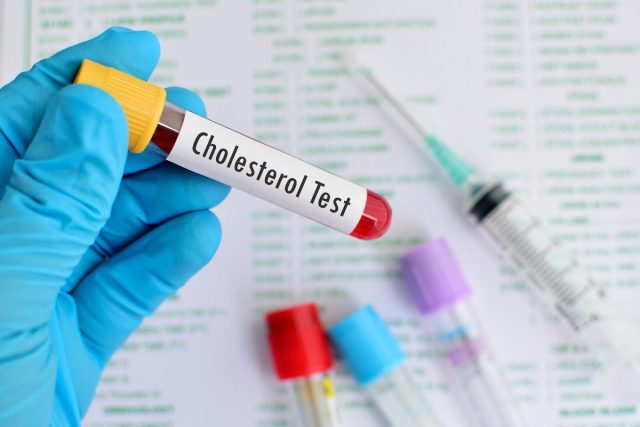High cholesterol might not make as many headlines as other health issues, but it's a serious concern that affects an alarming amount of people. According to the Centers for Disease Control and Prevention, "Nearly 94 million U.S. adults age 20 or older have total cholesterol levels higher than 200 mg/dL. Twenty-eight million adults in the United States have total cholesterol levels higher than 240 mg/dL." In addition, the CDC states, "7% of U.S. children and adolescents ages 6 to 19 have high total cholesterol." If left untreated high cholesterol can cause major health complications so knowing the signs and getting your cholesterol checked is vital for your overall well-being. Eat This, Not That! Health spoke with Dr. Laura Purdy, MD, MBA, 'America's Doctor', Licensed to practice in all 50 states, Physician Executive, Psychologist, Digital Health Evangelist, Veteran who shares what symptoms of high cholesterol to look out for and why cholesterol is important. As always, please consult your physician for medical advice.
What is Cholesterol and Why is it Important?

Dr. Purdy tells us, "Cholesterol is a type of fatty molecule That circulates in the bloodstream. It usually comes from breaking down fatty molecules in the diet, but some people can have genetic or familiar conditions that cause their body to have a higher than average level in the body. There are a couple of different types of cholesterol, and we often talk about them in terms of good cholesterol or bad cholesterol. Good cholesterol is another term for HDL, which stands for high density lipoprotein. This particular type of cholesterol helps to remove other harmful types of cholesterol out of the body. LDL, which stands for low density lipoprotein, is the type of bad cholesterol that we often want to lower to prevent risk for cardiovascular disease. This type of cholesterol can contribute to plaque formation in the arteries inside of our bodies which can predispose us to outcomes such as heart attack and stroke. So it is important for us to understand the differences between the two types of cholesterol especially when it comes to long-term health."
What are the Dangers of High Cholesterol?

Dr. Purdy says, "High cholesterol is a very inflammatory state within the body. Many of our bodily organs are negatively impacted by high cholesterol. They can result in plaque buildup and narrowing of some of the important arteries in the body, such as in the heart, aorta, and the neck. This can increase someone's risk of having bad outcomes of narrowing of these by vessels, such as heart attacks, aneurysms, or strokes. High cholesterol occurs commonly with other medical conditions such as diabetes and high blood pressure."
Causes of High Cholesterol

According to Dr. Purdy, "There are certain types of high cholesterol that are genetic and run in families. For these people, even having a healthy diet, exercising, and having a healthy body mass index does not lower their cholesterol and they need to take medication to lower the cholesterol and prevent their long-term risk of heart attack and stroke. For other people, and is more commonly seen, high cholesterol is a result of dietary and lifestyle choices. Eating high fat foods, Obesity, cigarette smoking, and diabetes Are among the different types of risk factors that can increase someone's likelihood of having high cholesterol."
Cholesterol Skin Tumors

"Some people who have high cholesterol will develop xanthomas, which are deposits or little tumors of cholesterol seen in certain parts of the body," says Dr. Purdy. "They look like small, waxy, yellowish bumps and are very commonly seen underneath the eyes but can't be on a wide range of body parts. Xanthomas are a physical manifestation Of high cholesterol and people who have these types of small skin tumors should have bloodwork done to check."
Family Members with Heart Attacks at a Young Age

Dr. Purdy explains, "Heart attacks and coronary artery disease are common in the fifth, sixth, seventh decade of life and beyond. It usually takes this long for people to develop coronary artery disease after a lifetime of being exposed to risk factors such as smoking, diabetes, and obesity. However, When heart disease occurs in young people, especially in many young members of the same family, this is a clue that the family may have a predisposition to genetically elevated high cholesterol. People who have family members experiencing heart attacks in their 20s or 30s should be evaluated for genetic elevated cholesterol. It's important to identify this as soon as possible so that medication can be started to lower cholesterol and prevent early heart attacks."
Being Overweight

Dr. Purdy says, "Obesity is very stressful for the body, and causes several medical conditions including high cholesterol. There is a much higher percentage of elevated cholesterol in people who are overweight or obese than people who are not. This is even the case for children and adolescents, not just adults. For this reason, it is recommended that adults, teenagers, and children who have an overweight or obese BMI have screening blood work done as a part of their annual physical to assess their levels of cholesterol."
No comments:
Post a Comment